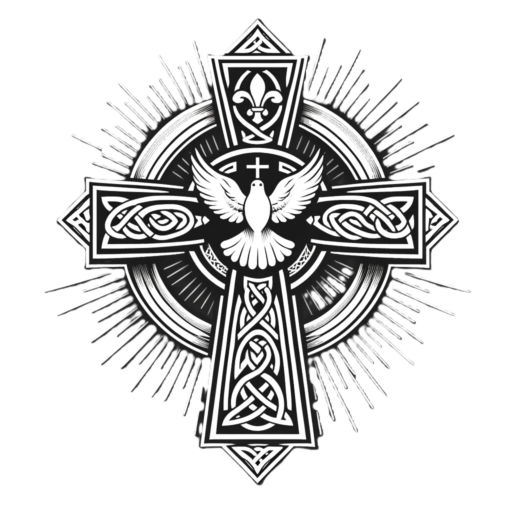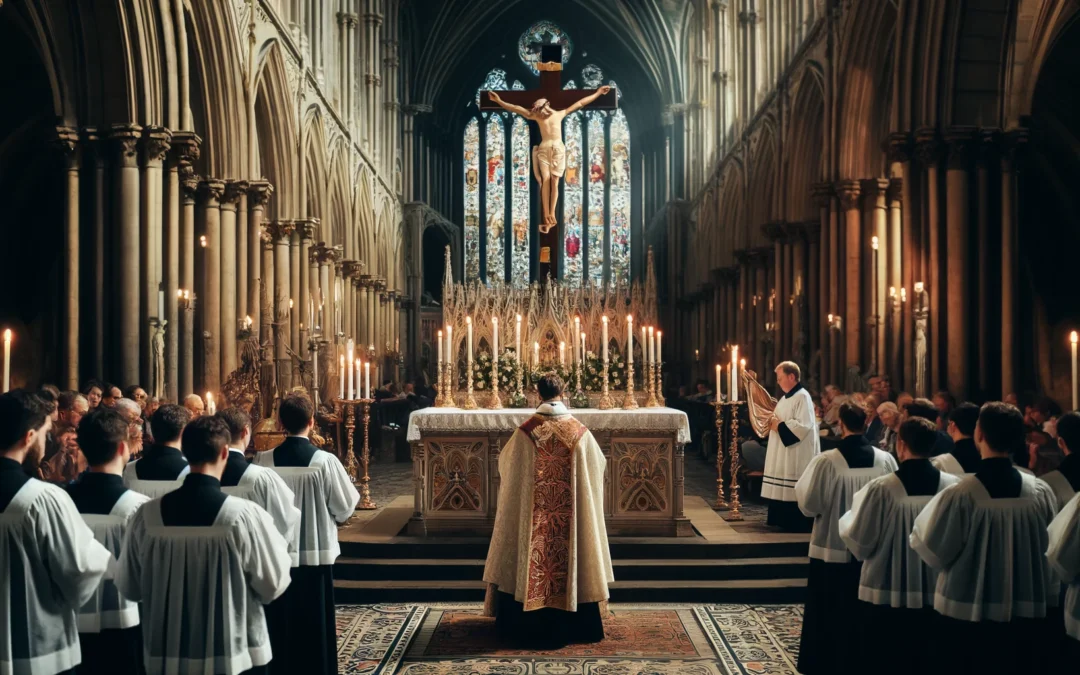
Daily Reflection notes on the Eucharist: REF: Bishop Challoner
The Blessed Eucharist: Sacrament and Sacrifice

On the Blessed Eucharist as a Sacrifice
1. Understanding the Eucharist:
- The Eucharist is both a sacrament and a sacrifice.
- As a sacrament, we receive Jesus’s body and blood to nourish our souls.
- As a sacrifice, we offer Jesus’s body and blood to God, remembering His death and showing our worship.
2. The Importance of Sacrifice:
- Sacrifice is a key act of worship, showing God is the master of everything.
- From the beginning, people offered sacrifices to God as a way to honor and worship Him.
- In the Old Testament, many types of sacrifices were made, like burnt offerings and sin offerings. These were symbols of the ultimate sacrifice to come.
3. The New Sacrifice:
- The old sacrifices were just a preview of the true sacrifice Jesus would make.
- Jesus’s sacrifice on the cross was once and for all, but the Eucharist allows us to remember and participate in it every day.
- The Eucharist is celebrated with bread and wine, representing Jesus’s body and blood, following the example of Melchizedek, a priest who offered bread and wine in the Old Testament.
4. The Ongoing Sacrifice:
- The essence of the Eucharist is in transforming bread and wine into Jesus’s body and blood.
- This act is performed by the priest, who represents Jesus.
- The Eucharist keeps the memory of Jesus’s sacrifice alive and applies its benefits to our souls daily.
- It’s a way for Christians to come together, worship, and unite with Jesus.
Conclusion:
- Make it a habit to participate in the Eucharist regularly.
- Appreciate the power and goodness of God shown in this sacrament.
- Respond with faith, hope, and love.
Original Text: MEDITATIONS FOR EVERY DAY IN THE YEAR BY BISHOP CHALLONER JUNE 14TH
Consider 2ndly, that as the law of Moses was to give way to the law of Christ, of which it was a figure; and the priesthood of the sons of Aaron was to yield to him that is a priest for ever according to the order of Melchisedech; so all these ancient sacrifices of the old law, which were but figures and shadows, were to make way for the new sacrifice of Christs’s institution; which is no other than that of his own body and blood, not as prefigured by the flesh and blood of calves or lambs, but as exhibited in truth, once in a bloody manner on the altar of the cross, daily to the end of the world, in an unbloody manner, on our altars, under the forms of bread and wine, agreeable to the priesthood and sacrifice of Melchisdech, which he offered in bread and wine, Gen. xiv. 18. Hence, in the thirty-ninth Psalm, spoken in the person of Christ, the sacrifice of his own body is substituted in the place of all those ancient victims, in these words. ‘Sacrifice and oblation thou didst not desire, but thou hast fitted a body to me (for so St. Paul reads it, Heb. x. 5.) Burnt-offering and sin-offering thou didst not require, than said I, Behold, I come.’ and this new sacrifice of the Christian church, this clean-offering, which should be ‘offered in every place among the Gentiles,’ is foretold (Malachi I. 11), and there accepted of by the Lord, at the same time that he declares he will receive no more of the Jewish sacrifices, v. 10.
Consider 3rdly, that this great sacrifice of the Eucharist essentially consists in the consecration of the bread and wine into the body and blood of Christ, and in the offering up of the same body and blood to God; by the ministry of the priest, as a perpetual memorial of the sacrifice of the cross, and a continuation of the same to the end of the world. For, by the separate consecration of the bread into the body of Christ, and of the wine into his blood, performed by the priest, in the name and person of Christ, our great high priest, Christ Jesus, presents himself to his Father upon our altars, as slain for us, and his blood as shed for us, and under this figure of death offers up his own body and blood, to answer all the ends and intentions for which we ought to offer sacrifice to God. Not as if there were any deficiency, or insufficiency in the sacrifice of the cross, by which he completely redeemed us, and opened to us the fountain of all mercy, grace, and salvation, but that we might have in this eucharistic sacrifice a standing memorial of our redemption, a daily means of applying the fruit of it to our souls, a daily communion one with another, by joining together in the solemn worship of sacrifice as the children of God had always done from the beginning, and daily means of uniting ourselves in thee mysteries with our high priest and victim, Christ Jesus, and of coming to God with him and through him.
Conclude to frequent daily this means of salvation, which our Lord has prepared for us in the eucharistic sacrifice; admire and adore the wonders of the power and goodness of God, manifested to us therein, and resolve to correspond with them by faith, hope, and love.

About Bishop Richard Challoner
Bishop Richard Challoner (1691-1781) was a prominent English Catholic bishop and theologian, best known for his extensive work in revitalizing English Catholicism during the 18th century. Born in England to Protestant parents, he converted to Catholicism and was ordained a priest in 1716. Challoner’s major contributions include his “Meditations for Every Day in the Year” and the revision of the Douay-Rheims Bible, making it more accessible to English-speaking Catholics. He served as Vicar Apostolic of the London District and worked tirelessly to support and guide the Catholic community during a time of severe anti-Catholic sentiment in England.

